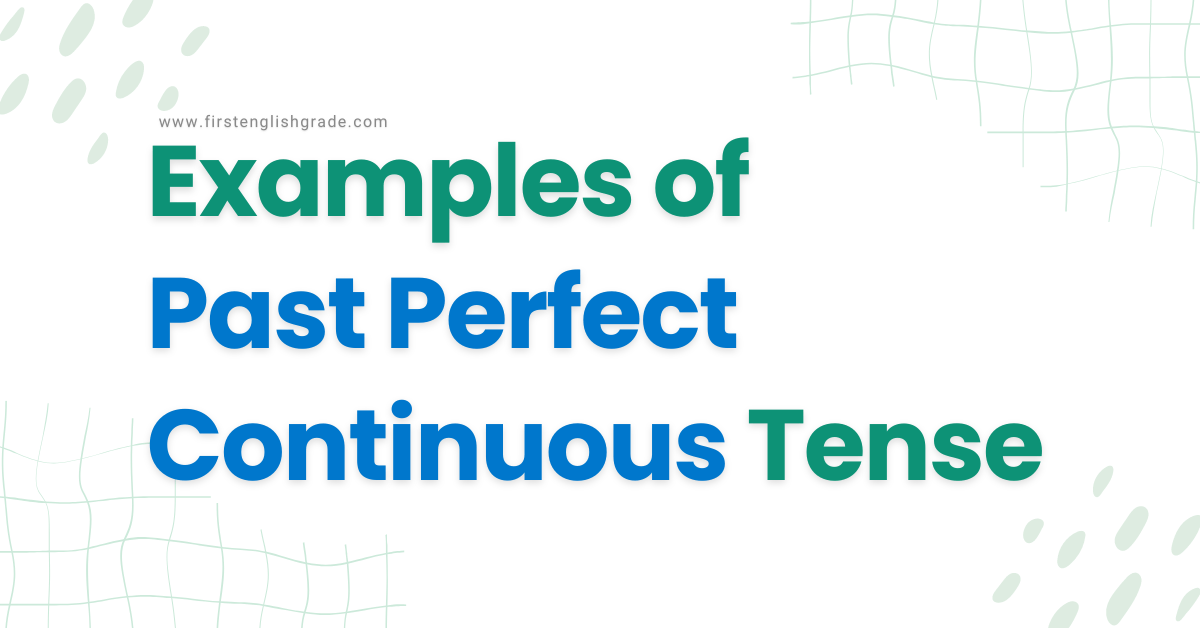Past perfect continuous tense is used to express or talk about things happening in the past. This tense indicates that an action had started in the past and continued for some time. You will learn 100+ examples of past perfect continuous tense through this article. These past perfect continuous tense examples will help you have a good command of the Tenses in English Grammar.
100 + EXAMPLES OF PAST PERFECT CONTINUOUS TENSE
Before we begin, you must understand how a sentence in the past perfect continuous tense is formed. We use these four sentence structures to form sentences in this tense:-
| Sentence Type | Structure |
|---|---|
| Affirmative Sentences | Subject + had + been + Verb (ing) + Object |
| Negative Sentences | Subject + had not (hadn’t) + been + Verb (ing) + Object |
| Questions/Interrogative Sentences | Had + Subject + been + Verb (ing) + Object? |
| Interrogative Negative Sentences | Had + Subject + not been + Verb (ing) + Object? Or, Hadn’t + Subject + been + Verb (ing) + Object? |
AFFIRMATIVE SENTENCES: EXAMPLES OF PAST PERFECT CONTINUOUS TENSE
- She had been talking to her mother when you arrived.
- We had been waiting for more than an hour when she finally arrived.
- My mom had been looking for this book for quite a long time.
- We had been going to the gym every day before it closed.
- They had been complaining about you.
- Jennifer had been learning English for a while.
- My dad had been looking forward to this moment for a long time.
- As long as they could remember, they had been dating for a long time before they got married.
- Her mother had been working all day.
- My daughter had been asking me to buy a new toy for a few months.
- Olivia had been going to the gym every day before she fell sick.
- They had been working in this company for 25 years.
- She had been talking about you when you got there.
- He had been drinking when we arrived.
- We had been waiting for 3 hours to get the tickets for the concert.
- The soldiers had been waiting for 2 hours for them to surrender before they started shooting.
- Mr. Smith had been living in this house for 20 years before he sold it.
- Ruby was exhausted because she had been cleaning her house all day.
- Before it started to rain, we had been playing in the park.
- My sister and her friends had been gossiping all night.
- Before starting our travel company, we had been traveling for quite a long time.
- Mona and I had been dating for a long time before she moved to another country.
- My brother had been planning a surprise party for my birthday.
NEGATIVE SENTENCES: EXAMPLES OF PAST PERFECT CONTINUOUS TENSE
- I had not been working all day.
- We had not been waiting for her to come.
- Mona hadn’t been checking her emails.
- My uncle had not been feeling well for quite some time.
- They had not been funding this project for a couple of months.
- Mr. Brown had not been drinking before the accident.
- Olivia hadn’t been watching TV for two hours.
- We hadn’t been shopping here.
- I had not been sitting in the garden before you came.
- She had not been sleeping all day.
- Her sister hadn’t been working here for a while.
- John had not been going to work for some time.
- She hadn’t been hoping to get a promotion.
- They hadn’t been thinking of ordering pizza.
- Jack and I had not been talking to each other for a long time.
- Alex failed the final exam because she had not been attending lectures.
- My laptop had not been working well for a long time. So, I had to take it to the repair center.
QUESTIONS/INTERROGATIVE SENTENCES: EXAMPLES OF PAST PERFECT CONTINUOUS TENSE
- How long had they been working on it?
- Had Monica been looking for this book?
- Had you been working last Monday?
- How long had she been feeling unwell?
- Had you been treating him so badly?
- Had your sister been working with Jack for 3 years?
- Had she been sleeping for 12 hours?
- How long had they been sitting there?
- Had she been waiting for me in the coffee shop for two hours?
- How long had she been waiting for you before she left the city?
- Had the passengers been sleeping when the flight crash happened?
- Had they been decorating their house for a couple of days before Christmas?
- How long had you been waiting for us yesterday before we went there?
- Had Alex been working here before you joined this company?
INTERROGATIVE NEGATIVE SENTENCES: EXAMPLES OF PAST PERFECT CONTINUOUS TENSE
- Hadn’t you been jogging for a few hours?
- Hadn’t she been missing her family?
- Had she not been attending English classes?
- Hadn’t she been looking for this dress for so long?
- Hadn’t she been waiting for you to marry her for so long?
- Hadn’t you been sleeping before she came?
- Had he not been following her for a few days?
- Had you not been cooking dinner when this happened?
- Hadn’t they been watching TV before you arrived?
- Hadn’t she been fighting with the manager for an hour?
- Hadn’t Jack been learning English before he came here?
- Hadn’t they been looking for their dog for two days?
- Hadn’t Tom been preparing for his exam?
- Had she not been learning English before she went to London?




